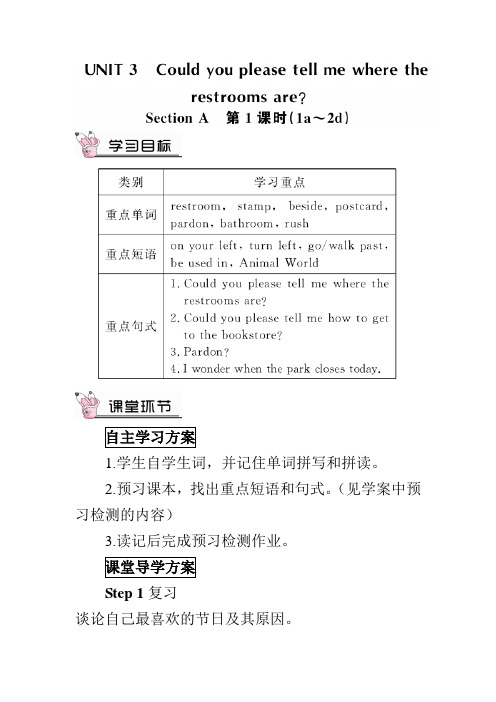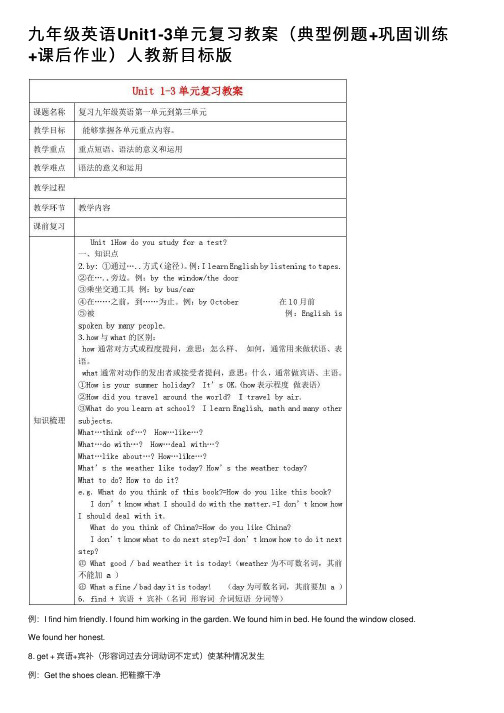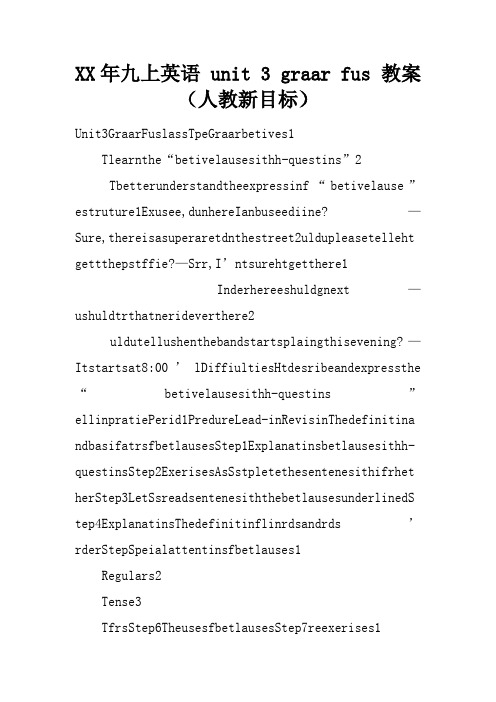九年级英语新目标Unit3复习教案
- 格式:doc
- 大小:33.50 KB
- 文档页数:4

人教版新目标九年级英语《Unit3 Could you please tell me where the restrooms are》教案Section A (1a-2d)1.重点单词:restroom,stamp,bookstore,beside,postcard,pardon,washroom,bathroom,normally,rush2.重点短语:take out the rubbish,fold your clothes,sweep the floor,make your bed,go out for dinner,get a ride3.重点句式:—Could you please tell me how to get to the bookstore.—Just go along Main Street until you pass Center Street.—Do you know when the bookstore closes today—It closes at 7:00 p.m. today.Do you know where I can get some postcardsI don't mean a room for resting.1.重点短语和句型2.疑问代词、疑问副词引导的宾语从句'疑问代词、疑问副词引导的宾语从句一、预习课本P17-18新单词并背诵,完成下面的汉译英。
1.洗手间________ 2.邮票________3.书店________ 4.在旁边________5.明信片________ 6.抱歉________7.洗手间________ 8.浴室________>9.通常________ 10.仓促________二、认真预习1a-2d找出下列短语和句型。
1.取一些钱________________________________________________________________________2.买一双鞋________________________________________________________________________3.—你能告诉我怎么到达商店吗—沿着Main大街走,直到你经过Center Street。

最新人教版新目标九年级英语Unit3单元教案课程目标- 帮助学生研究和掌握关于庆祝活动的词汇和表达方式。
- 培养学生的听、说、读、写能力,提高他们的英语交流能力。
- 通过小组合作和讨论,鼓励学生思考和分享自己的观点和经验。
教学重点- 研究并掌握与庆祝活动相关的词汇和表达方式。
- 学会用英语描述自己参加过和喜欢的庆祝活动。
- 研究以小组合作的方式讨论庆祝活动,分享彼此的观点和经验。
教学准备- 课本《最新人教版新目标九年级英语》第三单元相关教材和教辅材料。
- 录音设备或多媒体设备。
- 小组讨论的话题卡片。
教学过程导入(5分钟)- 利用多媒体设备播放相关庆祝活动的图像或视频,引起学生的兴趣和好奇心。
情境导入(10分钟)- 指导学生利用课本中的对话,进行口语对话练,研究和复与庆祝活动相关的词汇和句型。
听力训练(15分钟)- 播放英语听力材料,让学生听取庆祝活动的相关信息,并回答相关问题。
阅读练(15分钟)- 学生分组阅读相关庆祝活动的篇章,理解并回答问题。
口语表达(15分钟)- 学生利用小组讨论的话题卡片,就自己参加过和喜欢的庆祝活动进行交流和表达意见。
写作练(15分钟)- 学生就自己参加过的庆祝活动或对未来庆祝活动的期望进行书面表达。
小结(5分钟)- 复当天所学的庆祝活动的词汇、句型和表达方式。
教学延伸- 鼓励学生在课后进行更多的英语听力、阅读和写作练,扩充他们的英语能力。
教学评价- 观察学生在课堂上的口语表达和书面表达能力,并及时给予反馈和指导。
- 批改学生的作业,评估他们对庆祝活动的理解和运用能力。
参考资料- 《最新人教版新目标九年级英语》教材和教辅材料。
- 相关的英语听力和阅读材料。


自主学习方案1.学生自学生词,并记住单词拼写和拼读。
2.预习课本,找出重点短语和句式。
(见学案中预习检测的内容)3.读记后完成预习检测作业。
课堂导学方案Step 1复习谈论自己最喜欢的节日及其原因。
Step 2情景导入T:Do you know how to ask for help politely when you don't know where to go? You may say: Where is the…?Is it right? But it's an impolite way to ask for help. Who can ask for help politely? Oh, someone knows. Let's listen to him.T:Can you tell me how to ask for help?S: Sure.T:Please tell us.S:___1. Excuse me, could you tell me where the bank is?2. Excuse me, could you tell me how to get to the bank?3.…环节说明:通过师生对话引导学生进入本课时中心句:Excuse me, could you tell me…?Step 3完成教材(1a~2d)的教学任务1.根据图片完成1a中图片与文字搭配任务。
2.听录音,完成会话中的填空。
3.根据1a中的信息编对话,注意使用询问的含宾语从句的句子及其回答。
参考案例A:Excuse me, could you tell me___(1)how to get to …(2)where I can …(3)if/whether there is …B:Sure,___.(1)just go along…(2)you can…(3)there's a …on/in…A: Thanks. Do you know when…closes/opens?B:It closes/opens….4.听录音完成2a的练习。

九年级英语Unit1-3单元复习教案(典型例题+巩固训练+课后作业)⼈教新⽬标版例:I find him friendly. I found him working in the garden. We found him in bed. He found the window closed.We found her honest.8. get + 宾语+宾补(形容词过去分词动词不定式)使某种情况发⽣例:Get the shoes clean. 把鞋擦⼲净Get Mr. Green to come. 让格林先⽣进来I want to get my bike repaired. 我想去修⾃⾏车You can’t get him waiting. 你不能让他⽼等着7. 常见的系动词有:①是:am 、is、 are ②保持:keep、 stay③转变:become、 get、 turn ④ ……起来 feel、 look、 smell、taste、 sound9. 动词不定式做定语①与所修饰的名词构成主谓关系The next train to arrive was from New York. He is always the firstto come.②与所修饰的名词构成动宾关系I have nothing to say. I need a pen to write with.I need some paper to write on. I don’t have a room to live in.10. practice , fun 做名词为不可数名词practice +doing sth 练习做某事She often practice speaking English.她经常练习说英语。
13.all、 both、 always以及every复合词与not连⽤构成部分否定。
其完全否定为:all---none, both---neither, everything---nothing, everybody---nobody.14. be afraid of doing sth. / sth.害怕 be afraid of being alonebe afraid to do sth.害怕be afraid that恐怕担⼼,表⽰委婉语⽓17.a,an 与序数词连⽤表⽰“⼜⼀”,“再⼀”。

九年级英语Unit3 复习教案(Reading)教学目标:重点单词:choice/awake/imagine/worth/suggestion/cause/strict/valuable重点短语:deal with/do with/have no choice but to do/stay up/ be worth doing sthdream of/offer to do sth/be strict with sb/be strict in sth/according to重点句型:sb. finds/thinks /makes it+adj.+to do sth/so that引导目的状语从句【课前检测】单词默写:1.青少年的adj _________________________2.分数n _________________________3.发疯的;生气的adj _________________4.考试,测试n _______________5.或许,可能adv ______________________6.谁(宾格)pron _______________7.安静,寂静;沉默n ___________________ 8.担心;令人担忧的事n _____________ 9.方法n _________________________ 10.解决;解答vt __________________ 11.字典n _________________________ 12.青少年辅导员n _______________ 13.答复,回答n __________________短语默写:1. 得低、高分________________________2. 使我受不了________________________3. 设法完成某事________________________句子默写:1. 我不知道他怎么了。
九年级英语Unit 3 复习课教学设计教师寄语:One never loses anything by politeness.讲礼貌不吃亏。
复习目标:一:单元复习:1.熟练掌握本单元重点单词。
2.熟练掌握本单元重点词组及句型。
二:语法复习:1.了解宾语从句的概念。
2.熟练掌握宾语从句语序、时态的变化。
3.能够熟练选择宾语从句的引导词。
4.会区分if的两种用法。
【教学设计】让学生了解本节课的复习目标。
I.知识梳理1.重点单词:洗手间:___________邮票:__________在...旁:__________原谅,请再说一遍:________仓促,急促:___________建议v,_______,n_________.中心的,中央的:____________便利的:___________有礼貌的,客气的:__________副词___________反义词____________要求,请求:__________方向:__________正确的,恰当的:________住址:_________课程:___________2.重点短语:在...和...之间:_________ 请再说一遍:___________经过:______________在去...的路上:______________ 对...有礼貌:__________________寄信:_____________建议做某事:_________________3.重点句型:Could you please do...?Could you please tell me where the restrooms are?【教学设计】此部分是以听写的方式让学生强化本单元的重点内容。
II.语法复习1.概念:①.宾语:指一个动作(动词)的接受者,常置于动词,介词之后,也有双宾语结构。
完成句子:我正在看电视。
I ______ _______ _________.他们对英语感兴趣。
九年级unit3教学设计Teaching aims: 1.复习unit3词汇,掌握并准确运用四会词汇、重点句型。
2.进行中考题型练习。
Focus: 掌握并准确运用unit3四会词汇、重点句型Teaching aids: 多媒体Teaching steps:Step One Remember the words and phrases quickly1.Ask four students to write the words on the black and check with the class.1.邮票________2.浴室________3.路过;经过________4.葡萄________5.建议________6.抱歉,对不起;请再说一遍________7.便利的;方便的________8.拐角;角落________9.礼貌地________10.方向;方位________11.正确的;恰当的_________12.直接的;直率的_________13.不礼貌的;粗鲁的_________14.地址;住址;通讯处_________15.地下的;地铁_________16.停车场;停车区_________17.课程;学科_________18.adj.意大利(人)的; n.意大利人;意大利语_________2.Get the students to change the words:1.动词变名词:1.suggest→_______________, speak→________,2.名词变形容词:east→___________, Italy→___________,3.反义词(加词缀):polite→____________, direct→_______________3.Let the students write the phrases and read aloud.1. a________ of 一对/双/副/……2.________ one's left/right 在某人的左/右边3.________…and… 在……(两者)之间4. ________ one's way ________…在某人去……的路上5. pass________ 路过6. get ________ 到达7.________ me 什么;请再说一次8. depend ________ 依赖;取决于9.________ lot 停车场10. lead in ________ 导入11. the ________ of ……的角落12. be ________ a ________ (to do sth.)匆忙(做某事)13. look forward ________ 盼望;期待14. ________ the________ time 第一次15. ________ the third________ 在三楼16.________ right 向右转Step Two Wtite and remember the sentencesAsk the students to finish the sentences and remember them.1.打扰一下,你能告诉我怎样到书店吗?Excuse me, could you please tell me ________ ________ ________ to the bookstore? 2.我想知道接下来我们应该去哪里。
教材分析Unit 3 Could you please tell me where the restrooms are?一、相关教学内容在整个课程教材体系中的地位本单元以“Getting around”为话题,以“Ask for information politely”和“Follow directions”为功能,以宾语从句为主要语法内容,设计了以下内容:Section A该部分有4个模块:第一模块以“places”和相对应的“activities”为话题展开思维(1a)、听力(1b)、口语(1c)训练;第二模块围绕“directions”进行听力(2a-2b)和口语(2c-2d)训练;第三模块要求学生就一些活动场所的优点与缺点阐述自己的观点,并展开训练,训练形式为阅读、问答问题(3a)和(3b);第四模块以语法总结为主,然后是改写练习(4a),并以小组活动形式展开练习,联系生活实际角色表演(4c)。
Section B该部分有4个模块:第一模块是对一些描述性词汇的学习(1a)和运用所提供的词汇以pairwork的形式进行讨论(1b);第二模块以三个对话为载体,对“places”和“directions”进行听力(1c-1d)及口语(1e)训练;第三模块是一个有关“suitable language”的阅读材料,训练形式为填表(2c-2d)和写作训练(3a-3b);第四模块Self Check主要通过习题巩固本单元所学内容。
本单元的话题、功能、语法内容在整个初中阶段的英语教学中占有重要位置,尤其是宾语从句,每年中考都会涉及到。
二、不同教材版本对相关教学内容的处理本单元是人教版九年级英语Unit 3 Could you please tell me where the restrooms are?,和鲁教版Unit12教学内容及处理方式方法相同。
三、课程教材内容的整合本单元教材内容可以和七年级英语下册Unit 8 Is there a post office near here? 和八年级英语下册Unit 3 Could you please clean your room? 进行整合复习。
九年级英语新目标Unit3复习教案高桥初中陈伟学科:英语课型:复习年级:九年级主备人: 陈伟内容:Unit 3 Teenagers should be allowed to choose their own clothes一、学习目标:1 用be allowed to do 会谈论被允许不被允许做什么,从而掌握被动句的用法2 表达同意和不同意3 话题:同学们在懂得享受自由的同时,还须接受家长的建议。
鼓励学生发表青少年应该做哪些不应该做哪些。
二、重点词组和句型(一). 词组:1 part-time jobs2 driver's license3 get their ears pierced4 so do we5 fail a test6 get to doing sth 着手做某事7 get noisy8 have an opportunity to do sth . 9 be a good experience for sb.10 have Friday afternoons off 11 the other day 12. concentrate on sth13 learn from at present=at this time , now 14 be serious about . . 15.sixteen-year-olds16. be strict with sb be strict in sth17. old people's home 18 instead of 19 stay up 20 in the way21 learn from 22 have an opportunity to do sth(二). 句型1. I think sixteen-year-olds should be allowed to drive2 Do you think thirteen-year-olds should be allowed to have part-time jobs ?3. Anna is allowed to wear her own clothes.4. They are not serious enough at that age.5 I'm not allowed to go out on school nights.三、难点点拨解疑:语法内容: 被动语态1."语态"表示主语和谓语动词之间的关系。
英语中有"两态"的说法,即主动语态和被动语态,本单元中反复出现的should be allowed to do 就是一个含有情态动词(should)的被动语态。
2. 被动语态的用法:(1)不知道或没有必要说明动作的执行者是谁Such books are written for children.I haven't been told about it .(2)强调动作的承受者,这时应用by短语。
The cup was broken by David.(3)作客观说明时,常采用一种被动语态句型It's / was said / believed / reported / + that …It's reported that about three hundred people were killed in this earthquake.3. 被动语态的几种类型(1)有两个宾语的句子的被动语态(直接宾语,间接宾语)常见的接双宾语的动词有pass, give, buy, show, draw, make等通常这种句子可以改为以"人"(间接宾语)当主语;和以"物"(直接宾语)当作主语的两种被动语态。
如果"物"作为被动句的主语,则要在间接宾语前加上想搭配的介词如:He gave me a book.-I was given a book by him. (以I做主语)-A book was given to me by Tom. (以物book作主语)(2)含有宾语补足语的句子的被动语态keep, make 等动词常常有宾语补足语,在被动语态中,宾语补足语位置不变。
I saw him go into the office building.-He was seen to go into the office building.英语中有"十大动词"的说法,即feel , hear , listen , have , make , let , look , watch , see , notice ,这些词在主动句中,其后充当宾语补足语的动词不定式不加to,但变成被动句时必须加to.(3)含有短语的主动语态变被动语态不及物动词没有宾语,因此没有被动语态。
但有的不及物动词后面加上介词及其他一些词类构成短语动词之后,其作用相当于及物动词,可以接宾语,因而也可以变为被动语态。
在变成被动语态时,不能去掉构成短语动词的介词或副词They take good care of my child.-My child is taken good care of附:动词短语的被动语态take care of -be taken care ofcut down -be cut downlaugh at -be laughed atlook after-be looked after下列这些短语本身即是被动语态的形式,不需再加-bybe covered with …用…覆盖着be interested in …对…感兴趣be surprised at …对…感到惊奇be made of (from)用…制造的(4)由情态动词形成的被动语态含有情态动词的句子在变为被动语态时,在情态动词后面加上be动词即可,其句型如下: 肯定句:主语+情态动词(can , may , must)+be+ 过去分词…否定句:主语+情态动词+not + be + 过去分词…疑问句:情态动词(Can , May , Must )+主语+be+过去分词+….如:We should allow teenagers to surf the Internet .-Teenagers should be allowed to surf the Internet.Can you use it ? 你会使用它吗?-Can it be used ?4. 不能用于被动语态的几种情况(1)当主动结构中的宾语是反身代词和相互代词时,不能改为被动语态。
He saw himself in the mirror.We often help each other.(2)当谓语是表状态的及物动词时(如have , like , take place , belong to …)如I like these flowers. 我喜欢这些花。
I will have a meeting.不说A meeting will be had. 应说A meeting will be held .当堂练习:一、选择填空。
1. In some countries, tea ______ with milk and sugar.A. is servingB. is servedC. servesD. served2. Great changes _____ in my hometown since 1980.A. have been taken placeB. took placeC. have taken placeD. were taken place3. The new type of car is going to ______ in three years.A. turn outB. be turned outC. has turned outD. have been turned out4. The woman murdered her friend and ______ to ______.A. was sentenced, deathB. sentencing , dieC. sentenced, deathD. sentenced , die5. -Do you like the skirt ?-It _______ soft.A. is feelingB. feltC. feelsD. is felt6. Are you still here? You were here an hour ago. Who ________ for?A. are you waitingB. did you waitC. were you waitingD. do you wait7. _____ to know Professor Zhang.A. He saidB. I saidC. He is saidD. It says8. -I want to sit at the table near the window.-Sorry , ______ already.A. it tookB. it takesC. it is takingD. it has been taken9. The letter _______ three days ago and it ______ yesterday.A. had post, had arrivedB. was posted, arrivedC. posted, arrivedD. had been posted, was arrived10. He told me that the final examination _______ next Thursday.A. is givenB. will be givenC. would have givenD. would be given11. I ______ to have a part-time job.A. am not allowB. not allowC. don't allowD. am not allowed12. Sixteen-years-olds shouldn't ______ to go to an Internet bar.A. be allowedB. be allowC. allowD. are allowed13. _____ middle school students allowed to use mobile phone at school ?A. DoB. DidC. AreD. Can14. Students _____ to use E-mail English in everyday writing.A. may notB. can'tC. shouldn'tD. shouldn't be allowed15. I don't think teenagers should be allowed to drive , because they are____.A. not enough seriousB. not serious enoughC. too seriousD. to serious16. Which of the following school rule is true.A. students are allowed to make noise in the hallway.B. students are allowed to wear their own clothes.C. students are allowed to wear earringsD. students are allowed to ask teachers questions in class.17. I have to stay at home ______ school nights.A. inB. atC. onD. for18. Many students will be ______ if the class is boring.A. sleepB. sleepyC. sleepingD. slept19. -I think teenagers shouldn't be allowed to smoke.-I agree ______ you.A. withB. onC. aboutD. for20. The National Day is coming, we'll have 7 days ______.A. onB. offC. upD. down。